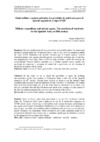Please use this identifier to cite or link to this item:
https://accedacris.ulpgc.es/jspui/handle/10553/17128
| Title: | Gasto militar y agentes privados: la provisión de uniformes para el ejército español en el siglo XVIII | Other Titles: | Military expenditure and private agents. The provision of wardrobe for the Spanish Army in 18th century | Authors: | Solbes Ferri, Sergio | UNESCO Clasification: | 5301 Política fiscal y hacienda pública nacionales 55 Historia |
Keywords: | Hacienda Uniformes Siglo XVIII España Contractor State, et al |
Issue Date: | 2015 | Journal: | Tiempos modernos. Revista Electrónica de Historia Moderna | Abstract: | En este estudio pretendemos comprobar si es posible aplicar las pautas que definen el patrón latino de «Contractor State» para el caso de la monarquía española del siglo XVIII. Habiendo sido posible observar que el Estado español recurrió sistemáticamente a los agentes privados para la provisión de uniformes para el ejército, nos preguntamos hasta qué punto confió en dicha relación o trató sin embargo de condicionarla. Nuestro análisis concluirá que el Estado español estuvo mucho más pendiente de conservar y aumentar el control de la provisión que de fomentar el desarrollo económico de la nación. In this study we try to check the possibility to apply the defining characteristics of the Latin pattern of Contractor State in the case of the Spanish monarchy in 18th century. Having been possible to observe that the Spanish State systematically resorted to private operators for the provision of wardrobe, we wonder how such trust relationship was or if the State tried to condition it at all times. Our analysis concludes that the Spanish State took much more keeping with the control of the provision than promoting the economic development of the nation. Dans ce travail, nous nous demandons si ce que l'on entend par version latine du "Contractor State" peut s'appliquer au cas de la monarchie espagnole au XVIIIe siècle. Ayant observé que la monarchie avait recouru de façon systématique à des agents privés pour la fourniture d'uniformes à ses armées, nous nous demandons jusqu'à quel point elle avait confiance dans la relation nouée avec eux ou, au contraire, tâchait d'imposer ses conditions. Notre conclusion est qu'elle s'attachait avant tout à conserver et renforcer son contrôle sur la fourniture, plutôt que de chercher à susciter le développement économique de la nation. |
URI: | https://accedacris.ulpgc.es/handle/10553/17128 | ISSN: | 1699-7778 | Source: | Tiempos modernos: revista electrónica de Historia Moderna [ISSN 1699-7778], v. 8 (30) | Rights: | by-nc-nd |
| Appears in Collections: | Artículos |
WEB OF SCIENCETM
Citations
1
checked on Feb 25, 2024
Page view(s)
48
checked on Jan 10, 2026
Download(s)
53
checked on Jan 10, 2026
Google ScholarTM
Check
Share
Export metadata
Items in accedaCRIS are protected by copyright, with all rights reserved, unless otherwise indicated.
